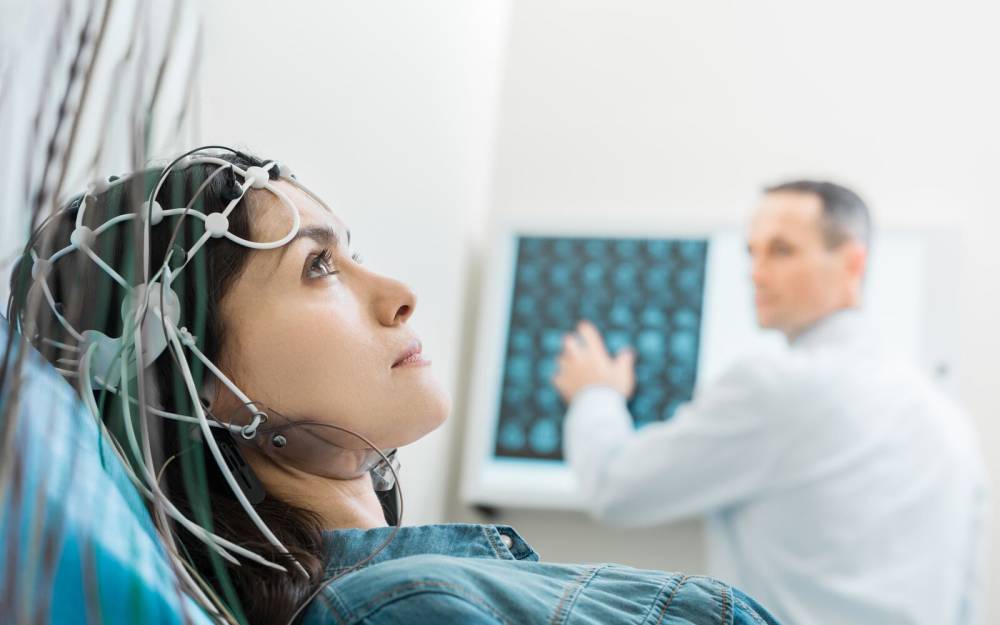
The department of Neurology at Prabha Hospital offers expertise in diagnosis and treatment for patients suffering from diseases of the nervous system, which includes the brain, spinal cord and peripheral nervous system. Over the past several years, we have seen an explosion of new knowledge regarding the working of human brain and nervous system. These scientific advances have led to new ways to diagnose neurological disease, new methods for treating previously untreatable diseases, and new insights into the effective management of stroke, dementia, epilepsy, Parkinsonism, amyotrophic lateral sclerosis (ALS), multiple sclerosis, Alzheimer's, Tourette’s syndrome and other neuromuscular diseases.
An ischemic stroke occurs when the blood supply to part of the brain is interrupted or reduced, preventing brain tissue from getting oxygen and nutrients. Brain cells begin to die in minutes. A stroke is a medical emergency, and prompt treatment is crucial
Epilepsy is a central nervous system (neurological) disorder in which brain activity becomes abnormal, causing seizures or periods of unusual behavior, sensations and sometimes loss of awareness. Anyone can develop epilepsy. Epilepsy affects both males and females of all races, ethnic backgrounds and ages.
Neuropathy is damage or dysfunction of one or more nerves that typically results in numbness, tingling, muscle weakness and pain in the affected area. Neuropathies frequently start in your hands and feet, but other parts of your body can be affected too.
Myopathy is a general term referring to any disease that affects the muscles that control voluntary movement in the body. Patients experience muscle weakness due to a dysfunction of the muscle fibers. Some myopathies are genetic and can be passed from parent to child.
Guillain-Barré syndrome, sometimes known as GBS, is a rare but serious autoimmune disorder in which the immune system attacks healthy nerve cells in the peripheral nervous system (PNS). This leads to weakness, numbness, and tingling. It can eventually result in paralysis.
Dementia is the loss of cognitive functioning — thinking, remembering, and reasoning — to such an extent that it interferes with a person's daily life and activities.
Degenerative brain diseases are caused by the decline and death of nerve cells called neurons. These diseases are progressive, meaning that the condition worsens over time as greater numbers of neurons in the brain die. As the brain gradually deteriorates, the patient loses intellectual function in key areas like speech, memory and spatial skills.
Parkinson's disease is a brain disorder that leads to shaking, stiffness, and difficulty with walking, balance, and coordination. Parkinson's symptoms usually begin gradually and get worse over time. As the disease progresses, people may have difficulty walking and talking.
The term "movement disorders" refers to a group of nervous system (neurological) conditions that cause abnormal increased movements, which may be voluntary or involuntary. Movement disorders can also cause reduced or slow movements.
Myasthenia gravis (my-us-THEE-nee-uh GRAY-vis) is characterized by weakness and rapid fatigue of any of the muscles under your voluntary control. It's caused by a breakdown in the normal communication between nerves and muscles.
Neurological infections encompass a large variety of conditions that invade and affect the nervous system. Despite advances in therapy and the development of early detection techniques, many of these conditions can cause severe, chronic and even life-threatening problems for those affected by them.
A demyelinating disease is any condition that results in damage to the protective covering (myelin sheath) that surrounds nerve fibers in your brain, optic nerves and spinal cord. When the myelin sheath is damaged, nerve impulses slow or even stop, causing neurological problems.
Obstetric disorders causing coma and seizures include eclampsia, acute fatty liver of pregnancy, and amniotic fluid embolism. Preexisting disorders such as epilepsy may worsen in one-third of pregnant patients, and seizures are common during labor.
An autoimmune disorder occurs when the body's immune system attacks and destroys healthy body tissue by mistake. There are more than 80 types of autoimmune disorders.
A paraneoplastic syndrome is a set of signs and symptoms that occur in people with a cancerous tumor. They develop when a malignant tumor releases a substance (hormone/protein) which affects a certain body system or when the body’s immune system releases a substance (antibody) meant to kill the tumor but also damages healthy body cells (autoimmune response).